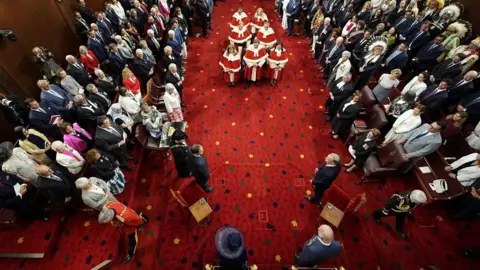ARTICLE AD BOX
Jessica Murphy
BBC News
Reporting fromToronto
Watch: Borders, diversity and the US: Key highlights from the King's speech in Canada
King Charles has given a major speech at the opening of parliament in Canada in which he sought to define its place in an uncertain world and its relationship with the US.
The address in Ottawa laid out priorities for new Prime Minister Mark Carney, whose Liberals won the country's general election in April - a campaign that was dominated by US President Donald Trump's threats to Canada's independence.
The King, who is Canada's head of state, said relationships with partners, including the US, were changing, and he stressed the sovereignty of both nations.
Here are five takeaways from Tuesday's address, which was the first time a monarch has delivered the throne speech opening parliament in almost 50 years.
A direct message to the US on sovereignty
Carney's invitation to King Charles, who is Canada's ceremonial head of state, was in part a message to Trump, who has made repeated remarks undermining its sovereignty.
Tensions with Canada's neighbour were a theme throughout, though the US president was never mentioned by name.
The speech opened with a wave of patriotism as a trade war with the US, Canada's largest economic partner, looms. The King spoke of the "pleasure and pride" of being in the country "as we witness Canadians coming together in a renewed sense of national pride, unity, and hope".
He expressed his "admiration for Canada's unique identity" and its growth since the last time a sovereign opened parliament - Queen Elizabeth II in 1955. (She gave a second throne speech 20 years later).
It has become "a bold, ambitious, innovative country".
"The Crown has for so long been a symbol of unity for Canada," the King said. "It also represents stability and continuity from the past to the present. As it should, it stands proudly as a symbol of Canada today, in all her richness and dynamism."
The speech concluded on a similar note: "As the anthem reminds us: The True North is indeed strong and free!"
The King's decision to open parliament - a role traditionally left to the governor general, who is the monarch's top representative in Canada - is seen as a symbolic show of support for the Commonwealth nation.
Canada in an uncertain world
Another major theme of the speech is how Canada will face a world with "unprecedented challenges, generating uncertainties across the continents".
Another nod to the US and tensions between the two countries followed:
"The system of open global trade that, while not perfect, has helped to deliver prosperity for Canadians for decades, is changing. Canada's relationships with partners are also changing," the King said.
The speech underscored the need for the country to reinforce its established trading relationships, notably with European allies, while moving forward with economic and security relationship talks with the US.
During the recent election campaign, Carney repeatedly said the country was at a pivotal moment in its history.
Tuesday's speech emphasised that "this moment is also an incredible opportunity".
"An opportunity to think big and to act bigger. An opportunity for Canada to embark on the largest transformation of its economy since the Second World War."
Plans for the trade war and economic growth
King Charles also focused directly on domestic policy and plans set out by Carney's Liberals to address the country's economic headwinds.
There was a commitment to speed up major national infrastructure projects and to double a loan programme that would enable more indigenous ownership of major projects.
The government also said it would introduce legislation by 1 July to remove federal barriers to internal trade within the country. According to the government, interprovincial trade and labour mobility barriers cost the country as much as C$200bn ($145bn; £107bn) each year.
Opposition parties reacted to the Liberal government's domestic agenda laid out in the speech, with Conservative leader Pierre Poilievre saying it lacked "specific plans" on implementing some of the big commitments, like energy projects.

 Reuters
Reuters
Tackling housing, affordability and crime
Canada faces housing affordability crises as housing prices have skyrocketed across the country in the last decade.
Alongside the US-Canada relationship, it was one of the top issues on the campaign trail. Carney's Liberals promised to double the rate of building to 500,000 new homes a year.
The speech underscored the government's other plans to address the issue, including investing in prefabricated and modular housing, and cutting municipal development charges in half for housing with multiple units.
There was a pledge to deliver on another campaign promise - to end a goods and services tax for first-time homebuyers on houses costing less than C$1m. The King highlighted other plans to drive down costs for Canadians, including a tax cut for the lower middle-class.
Another major issue during the campaign was crime. The speech contained promises to address tougher penalties for car thefts, home invasions, human trafficking and drug smuggling.
House Leader Alexandre Boulerice for the left-wing NDP said after the speech that there were "big holes" on issues like climate and women's rights.
A boost to defence and border spending
Canada has been under mounting pressure from the US and other Nato partners to increase its military spending, as it continues to fall short of the 2% of GDP on military spending target set out for alliance members.
Carney has committed to hitting that benchmark by 2030.
Tuesday's speech contained commitments to "rebuilding, rearming, and reinvesting" in its military; reinforcing defence relationships with European allies, including by joining Rearm Europe, a plan to dramatically increase defence spending on the continent; and to strengthen Canada's Arctic presence.
Last week, Carney also said that "high level" talks are taking place with the US about joining its proposed "Golden Dome" missile defence system, aimed at countering futuristic threats.

 1 day ago
26
1 day ago
26








 English (US) ·
English (US) ·